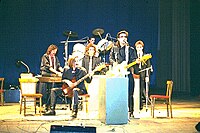Nautilus Pompilius (band)
Soviet, and later Russian, rock band From Wikipedia, the free encyclopedia
Nautilus Pompilius (Russian: Наутилус Помпилиус), sometimes nicknamed Nau (Russian: Нау), was an influential Soviet, and later Russian, rock band[1] founded in Sverdlovsk in 1982 by Vyacheslav Butusov and Dmitry Umetsky. Butusov disbanded the group in 1997, after multiple albums and several different line-ups of the band.
This article has multiple issues. Please help improve it or discuss these issues on the talk page. (Learn how and when to remove these messages)
|
Nautilus Pompilius | |
|---|---|
 Nautilus Pompilius in concert, late 1980s. | |
| Background information | |
| Origin | USSR, Russia |
| Genres | Art rock, post-punk, new wave, gothic rock, alternative rock |
| Years active | 1982–1988, 1990–1997, 2003–2004, 2013–2014 |
| Past members | Vyacheslav Butusov Dmitry Umetsky Ilya Kormiltsev† Aleksey Mogilevsky Nikolay Petrov† Albert Potapkin Andrey Sadnov Igor Goncharov Aleksandr Zarubin Anastasiya Poleva Viktor Komarov Vladimir Nazimov Aleksey Khomenko Yegor Belkin Vladimir Yelizarov Igor Dzhavad-Zade Aleksandr Belyayev |
Name
The band was originally named "Ali-Baba and the Forty Thieves" (Russian: "Али-Баба и сорок разбойников"). In 1983, at the suggestion of the band's sound director, Andrei Makarov, the band's name was changed to Nautilus. In 1985, under the initiative of Ilya Kormiltsev, the name was lengthened to Nautilus Pompilius to avoid confusion with other Russian rock bands that were also named Nautilus at the time, such as the Moscow group led by Evgeny Margulis.
The band later elaborated on the name, saying "The band is named after the nudibranch mollusc, which is naturally beautiful and charming." [citation needed] Nautilus pompilius is the scientific name of a species of cephalopod (mistakenly called a nudibranch by the band) commonly known as the Chambered Nautilus.
History
Founding
Vyacheslav Butusov and Dmitry Umetsky took the first steps towards forming Nautilus in the late 70s. At first, the band performed at small events, covering songs by foreign performers and famous native performers like Mashina Vremeni and Voskreseniye. The band was formed by Butusov and Umetsky.
In 1982, the group made its first attempts to record its own songs. The band's first album, Pereyezd (Russian: Переезд), was released in 1983. The album was strongly influenced by Led Zeppelin.[citation needed]
Later
The band was active in various incarnations from 1983 to 1997. Since the group disbanded, Vyacheslav Butusov has launched a solo career.
Members

Discography
| Year | Russian name | English transliteration (translation) |
|---|---|---|
| 1983 | Переезд | Pereyezd (Resettlement (or Highway Crossing)) |
| 1985 | Невидимка | Nevidimka (The Invisible One) |
| 1986 | Разлука | Razluka (Separation), a name of a Russian folk song featuring in the album |
| 1987–1988 | Ни Кому Ни Кабельность (LIVE) | Ni Komu Ni Kabel'nost' (pun; nekommunikabel'nost' means 'lack of sociability' (a loanword, from communicate and -able-) and nikomu ni means 'to nobody' |
| 1988 | Князь Тишины | Knyaz' Tishiny (Prince of Silence), after a poem by Endre Ady |
| 1988 | Отбой (LIVE) | Otboy (Lights-out) |
| 1989 | Человек без имени | Chelovek Bez Imeni (Man With No Name) |
| 1992 | Чужая земля | Chuzhaya Zemlya (Foreign Land) |
| 1994 | Титаник | Titanic |
| 1994 | Титаник-LIVE | Titanic-LIVE |
| 1995 | Крылья | Kryl'ya (Wings) |
| 1996 | Лучшие Песни (LIVE) | Luchshie Pesni (Best Songs) |
| 1997 | Яблокитай | Yablokitay (China-apple, Dutch etymologization of Russian apel'sin 'orange fruit') Produced By Bill Nelson |
| 1997 | Атлантида | Atlantida (Atlantis) |
References
External links
Wikiwand - on
Seamless Wikipedia browsing. On steroids.
